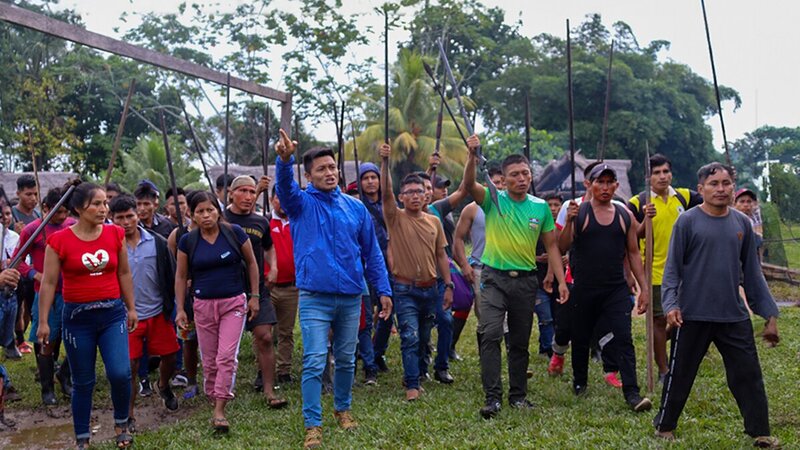
Wampís Nation Announces Start Of Eviction Of Illegal Mining On River Santiago And Demands That Peruvian State Fulfils Its Duty In The Face Of Systematic Neglect

After formally communicating its decision to eradicate illegal mining, the Wampís Government is taking action in response to the Peruvian government's negligence and lack of guarantees to protect the lives of the border people in Condorcanqui, Amazonas.
GTANW Communications. 10 July 2025.- The Autonomous Territorial Government of the Wampís Nation (GTANW) reaffirms and initiates territorial self-defence action for the total eradication of illegal mining in the Santiago river basin (Kanus). The measure, which will be implemented from 10 July, is an autonomous response to the Peruvian state's systematic and historic failure to protect the Amazon, and is being activated after the country's highest authorities confirmed that they will not provide the necessary support for a safe and effective eviction.
Despite repeated warnings and the evident failure of the few and inefficient state interdictions in the Santiago River - which, on the contrary, have allowed illegal mining to grow stronger with more than 30 dredges operating with impunity - the state has maintained an alarming passivity and selectivity to effectively confront the mining invasion.
This negligence contradicts the climate and biodiversity commitments that Peru has assumed internationally, and is aggravated by decisions of the Congress of the Republic and the Ministry of Energy and Mines, such as the extension of the Integral Registry of Mining Formalisation (REINFO), a mechanism that, as has been demonstrated, is used by the systematic continuity of mafias to cover up their illicit activities.
"Our trust has been exhausted," declared Galois Flores Pizango, vice-president of the GTANW. "On 1 July, we formally communicated to the entire state apparatus our decision to act, demanding that they accompany us and do their duty. Their response has been negative, ineffective and evasive. By refusing to act, the Peruvian state leaves us alone, but that does not stop us. As inhabitants of this territory for millenia, we will do the work that they refuse to do to protect life", said Flores Pizango from the Wampís territory.
A Legitimate and Well-Founded Action
This autonomous decision is not an improvised act, but the exercise of fully recognised rights that the Peruvian state refuses to fulfil. As detailed in the formal letter sent to the country's highest authorities on 1 July, our action is based on the spirit and letter of ILO Convention 169, an international treaty that Peru has ratified and which enshrines our inalienable right to free governance and effective control of our territory. This right is, in turn, protected by our own Political Constitution in its articles 89 and 149, which recognise our legal existence, autonomy and powers to exercise jurisdictional functions. Furthermore, the Peruvian Constitutional Court itself has reinforced this power in its jurisprudence, as in the emblematic 'Tres Islas' case, where it expressly recognises our right to exercise control, surveillance and protection over our territory in the face of inaction by third parties.
The Negative and Inefficient Response of the State
The Peruvian state, via the Presidency of the Council of Ministers (PCM, its Spanish acronym), has stated that it will not provide support for the evictions, for which the GTANW had requested its participation and assistance. In a communication on 8 July, the PCM reiterated a partial response on
actions in the Cenepa basin until June, however, at no point did it mention any forceful action nor did it commit itself to any future activity to act against the mining invasion in the Santiago River.
Community Action for a Full Life in Common (Tarimat Pujut)
In response to this refusal, the Wampís Nation has issued a national and international statement in which it announces a peaceful protest mobilisation in the Santiago River basin starting on 10 July. The objective is the expulsion of illegal operators in order to safeguard human rights, water bodies, biodiversity and to avoid scenarios of violence and assassinations such as those already occurring in other parts of Peru (Pataz, Ucayali) due to illegal mining.
This action, within the framework of the jurisdictional functions of the GTANW, is not only territorial defence; it is a direct contribution to the global fight against climate change and a firm step towards the construction of our vision of the future: the Tarimat Pujut (full life in common).
Final Demand to the State
The GTANW demands that the Peruvian Ministry of the Interior (MININTER), the Ministry of Defence (MINDEF), the National Police of State (PNP) and the Navy fulfil their duty to assist and safeguard life during this legitimate action. We call on the Specialised Attorney’s Offices for the Environment (FEMA) and the Public Prosecutor's Office to be present to guarantee the peaceful eviction and to exercise their supervisory role against organised crime. Their absence will be the final proof of their abandonment.
The Wampís Nation strongly calls on the current government to safeguard human lives and to guarantee protection from any emergency that may arise, and calls on the media and civil society to monitor this just process of defending the Amazon.
About the GTANW:
The Autonomous Territorial Government of the Wampís Nation is Peru's first Indigenous government, established since 2015 for the protection in perpetuity of their 1.3 million hectare territory, which they have occupied for millenia, in the Amazonas and Loreto regions. The GTANW exercises its right to socio-territorial self-governance to protect its forests, rivers and culture, and to promote its own vision of community self-development, the Tarimat Pujut.
Press Contact:
Diego A. Benavente Marchán Email: [email protected]
Phone: +51 99894085
Aperçu
- Type de ressource:
- Press Releases
- Date de publication:
- 11 juillet 2025
- Région:
- Pérou
- Partenaires:
- Gobierno Territorial Autónomo de la Nación Wampís (GTANW)
